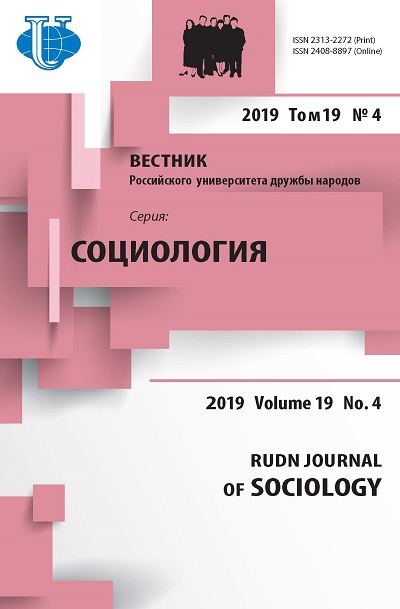Transformation of the information sphere of civil society
- Authors: Levashov VK1
-
Affiliations:
- Institute for Socio-Political Research of the Russian Academy of Sciences
- Issue: Vol 19, No 4 (2019)
- Pages: 651-664
- Section: Contemporary society: the urgent issues and prospects for development
- URL: https://journals.rudn.ru/sociology/article/view/22089
- DOI: https://doi.org/10.22363/2313-2272-2019-19-4-651-664
- ID: 22089
Cite item
Full Text
Abstract
The author considers new phenomena in the information sphere of civil society, their influence on the nature and forms of its development, emphasizing that the development of the Russian civil society follows the general formation of the global civil society. Humankind has come to the objectively inevitable and qualitatively new stage in the co-evolution of biosphere, society and technosphere - the emergence of noosphere. The social-political essence of the new stage of social evolution is the search for a sustainable life regime based on the principles of civil justice in the interests of everyone on the planet. Social statistics and sociology highlight the peculiarity in the development of digital technologies - the growth of material and informational dysfunctions of the global and regional scale. The information sphere that has developed in the neoliberal paradigm of economic, political, and social practices does not meet the new global challenges and the needs of civil society and social state for it continues to function in the interests of small elite groups. Misinformation becomes widespread, which leads to the loss by information of its key function of the reliable reflection of reality and to the partial transformation of the media into institutions of social and political manipulation. Based on the data of sociological studies, the author proves that the structure and forms of the Russian media dysfunctions reflect global trends, and concludes that the need for publicity is a result of the “truth crisis”; thus, the media’s task - to reliably reflect social reality - becomes an imperative and a pass to the future. The sustainable development of the global and Russian civil society depends on the successful social-political reconstruction of the information sphere based on the principles of co-evolution of man, society and nature.
About the authors
V K Levashov
Institute for Socio-Political Research of the Russian Academy of Sciences
Author for correspondence.
Email: levachov@mail.ru
доктор социологических наук, главный научный сотрудник и руководитель Центра стратегических социальных и социально-политических исследований Института социально-политических исследований Российской академии наук
Fotieva St., 6-1, Moscow, Russia, 119333References
- Bell D. Socialnye ramki informatsionnogo obshhestva [Social framework of the information society]. Novaya tekhnokraticheskaya volna na Zapade. Moscow; 1988 (In Russ.).
- Vernadsky V.I. Biosfera i noosfera [Biosphere and Noosphere]. Moscow; 2004 (In Russ.).
- Vernadsky V.I. Izbrannye sochinenija [Selected Works]. Moscow; Leningrad; 1954. Vol. 1 (In Russ.).
- Vernadsky V.I. O korennom materialno-energeticheskom otlichii zhivyh i kosnyh estestvennyh tel biosfery [On the fundamental material-energetic difference between the living and inert natural bodies of the biosphere]. Problemy biogeokhimii. Moscow; Leningrad; 1939, Vol. 2 (In Russ.).
- Wiener N. Kibernetika, ili upravlenie i svjaz v zhivotnom i mashine; ili Kibernetika i obshhestvo [Cybernetics, or Control and Communication in the Animal and the Machine; or Cybernetics and Society]. Moscow; 1983 (In Russ.).
- Vladimirova T.V. Setevye kommunikatsii kak istochnik informatsionnyh ugroz [Network communications as a source of information threats]. Sociologicheskie Issledovanija. 2011; 5 (In Russ.).
- Giddens A. Uskolzajushhij mir: kak globalizatsija menjaet nashu zhizn [Runaway World: How Globalization is Reshaping Our Lives]. Moscow; 2004 (In Russ.).
- Debord G. Obshhestvo spektaklja [The Society of the Spectacle]. Moscow; 2000 (In Russ.).
- Drobot V.A. Informatsionnaja sostavljajushhaja sovremennoj mirovoj politiki [Information component of the contemporary world politics]. Informatsionnoe Obshchestvo. 2018; 2 (In Russ.).
- Castells M. Informatsionnaja epoha: Ekonomika, obshhestvo i kultura [The Information Age: Economy, Society and Culture]. Moscow; 2000 (In Russ.).
- Kikhtan V.V. Issledovanie protsessov manipulirovanija massovym soznaniem v sovremennyh sredstvah massovoj informatsii [A study of the mass consciousness manipulation by the contemporary media]. Vestnik Volzhskogo universiteta imeni V.N. Tatishcheva. 2018; 2 (2) (In Russ.).
- Levashov V.K., Afanasiev V.A., Novozhenina O.P., Shushpanova I.S. Sostojanie grazhdanskogo obshhestva v Rossii. XLVII etap sociologicheskogo monitoringa “Kak zhivesh Rossija?”, maj 2018 goda [The Status of Civil Society in Russia. XLVII wave of the sociological monitoring “How Are You, Russia?”, May 2018]. Moscow; 2018 (In Russ.).
- Levashov V.K., Afanasiev V.A., Novozhenina O.P., Shushpanova I.S. Ekspress-informatsija. “Kak zhivesh, Rossija?”. XLVIII etap sociologicheskogo monitoringa, nojabr—dekabr 2018 goda [Express-information. “How are you, Russia?”. XLVIII wave of the sociological monitoring, November—December 2018]. Moscow; 2019 (In Russ.).
- Leonova O.G. Kibervojna i protivoborstvo v tsifrovom informatsionnom prostranstve [Cyber war and confrontation in the digital information space]. Informatsionnoe Obshchestvo. 2018; 2 (In Russ.).
- Naumenko T.V. Metodologichesky analiz konceptsii informatsionnogo obshhestva [Methodological analysis of the concept of information society]. Informatsionnoe Obshchestvo. 2018; 2 (In Russ.).
- Ozyumenko V.I. Medijny diskurs v situatsii informatsionnoj vojny: ot manipuljatsii — k agressii [Media discourse under the information war: From manipulation to aggression]. RUDN Journal of Linguistics. 2017; 1 (In Russ.).
- Sekareva I.V. Reklamnye i televizionnye mify kak forma manipuljatsii soznaniem [Advertising and television myths as a form of consciousness manipulation]. Znanie. Ponimanie. Umenie. 2011; 4 (In Russ.).
- Sokolov I.A., Kolin K.K. Razvitie informatsionnogo obshhestva v Rossii i aktualnye problemy informatsionnoj bezopasnosti [Development of information society in Russia and actual problems of information security]. Informatsionnoe Obshchestvo. 2009; 4, 5 (In Russ.).
- Webster F. Teorii informatsionnogo obshhestva [The Theories of Information Society]. Moscow; 2004 (In Russ.).
- Yanshina F.T. O pojavlenii i pervonachalnom tolkovanii termina “noosfera” [On the emergence and initial interpretation of the term “noosphere”]. Herald of the Russian Academy of Sciences. 1994; 64 (11) (In Russ.).
- Duff A.F. Information Society Studies. London; 2000.
- Gilbert F.S., Peterson T.B., Schramm W. Four Theories of Press. Urbana; 1956.
- Masuda Y. The Information Society as Postindustrial Society. Washington; 1983.
- May Ch. Information Society: A Sceptical View. Malden; 2002.
Supplementary files













